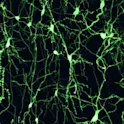
Featured news
14 Nov 2019
Self-cannibalizing mitochondria may set the stage for ALS development
Powerhouses of the cell ‘eat themselves up’ jumpstart path to neurodegenerative disease; Frontiers in Cellular Neuroscience

Featured news
14 Nov 2019
Powerhouses of the cell ‘eat themselves up’ jumpstart path to neurodegenerative disease; Frontiers in Cellular Neuroscience

Featured news
20 Aug 2019
Blue Brain Project’s ‘Channelpedia’ is open to brain modellers everywhere; Frontiers in Cellular Neuroscience

Featured news
25 Apr 2019
A study suggests that autism-related brain proteins are more tightly regulated in females than in males; Frontiers in Cellular Neuroscience

Featured news
02 Oct 2018
The most advanced digital replica of human neurons ever made reveals that our brain cells are unique; Frontiers in Cellular Neuroscience

Featured news
19 Mar 2018
Research Topic compiles the latest research into hearing loss caused by drugs and solvents – how it occurs, how to treat it, and how to prevent it.

Featured news
15 Dec 2017
3,350+ articles published this year, from 17,400+ authors

Neuroscience
13 Sep 2017
A new way to deliver steroids to the inner ear reduces hearing loss caused by chemotherapy, finds a study in Frontiers in Cellular Neuroscience.

Health
06 Jul 2017
Therapies to change the bacteria in the gut, through diet, pro-and prebiotic supplements, faecal matter transplants or antibiotics, could treat autism.

Neuroscience
08 Aug 2016
by Reeteka Sud, Frontiersin.org Hay fever may do more than give you a stuffy nose and itchy eyes — seasonal allergies may change the brain, says a study published in the open-access journal Frontiers in Cellular Neuroscience. Scientists found that brains of mice exposed to allergen actually produced more neurons than controls, they did this using a model of grass pollen allergy. The research team examined the hippocampus, the part of the brain responsible for forming new memories, and the site where neurons continue be formed throughout life. During an allergic reaction, there was an increase in the numbers of new neurons in the hippocampus, raising the question: what could be the consequences of allergies on memory? The formation and functioning of neurons is linked to the brain’s immune cells, the microglia. Scientists used to believe that immune cells are not active unless there is a threat such as injury or disease. That belief went out the window when it was discovered that microglia are in fact very active even in healthy brains, sculpting connections between neurons. The research team monitored the functioning of microglia in allergic animals. To the scientists surprise, they found that the same allergic reaction that kicks the […]

Health
29 Jul 2016
By Fabienne Eckert, Frontiersin.org A diet high in saturated fat can make your brain struggle to control what you eat, says a new study in Frontiers in Cellular Neuroscience. If people are looking to lose weight, stay clear of saturated fat. Consuming these types of fatty food affects a part of the brain called the hypothalamus, which helps regulate hunger. The fat causes inflammation that impedes the brain to control the food intake. In other words, people struggle to control how much they eat, when to stop and what type of food to eat – symptoms seen in obesity. The study found, through tests in rats, that a meal rich in saturated fat, reduces a person’s cognitive function that make it more difficult to control eating habits. “These days, great attention is dedicated to the influence of the diet on people’s wellbeing. Although the effects of high fat diet on metabolism have been widely studied, little is known about the effects on the brain;” explained Professor Marianna Crispino and Professor Maria Pina Mollica from the University of Naples Federico II. A diet rich in fat can take different forms and in fact, there are different types of fats. Saturated fats are found […]
Get the latest research updates, subscribe to our newsletter